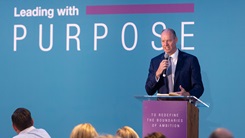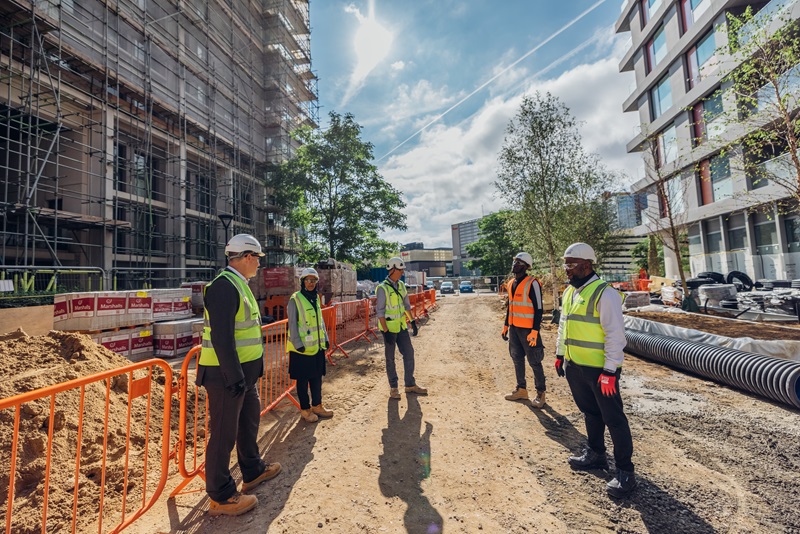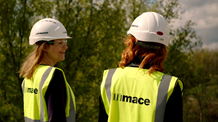Construction industry can pave the way to better support on mental health
We need to invest in the tools that enable people to stay well in work and prevent our workers from reaching crisis point.
It is no secret that the construction industry has a significant mental health challenge. That statistics, in particular those related to suicide, are both shocking and well documented.
People working in the UK construction industry are three times more likely to take their own lives than those in other sectors. That is a terrifying statistic and one the industry has been grappling with for several years.
With mental health conditions becoming more common, and growing economic challenges likely to affect the industry, we cannot afford to lose focus - we must take a radical approach.
The mental health challenge in the construction industry can be attributed to several factors, including lone working, unsociable hours, and work pressures.
But the main one is gender. The industry is still a male-dominated environment, particularly on building sites and, in general, men are not very good at opening up about their feelings and problems.
We know that talking about mental health is half the battle and, if a problem isn't shared, it isn't halved - rather, it becomes compounded.
Sadly, we have had a few cases in recent years where someone directly employed by Mace or one of our subcontractors has taken their own life. It is hugely traumatic for the whole project team. Construction sites have really close teams, so it hits everyone incredibly hard when a member is lost in such tragic circumstances. It is difficult to put into words how I feel, as chief executive, at such times. A deep sense of loss is what sits behind our ongoing efforts to prevent any such tragedy occurring in the future.
Over the past five years, the whole industry has opened up about mental health, but we still have a long way to go.
Challenging conformity to stereotypes that have existed for decades does not happen overnight and does not get fixed just because a chief executive or a head of human resources says it is “important that we talk more”. Culture change is a slow and steady, and often complex, process.
It has to start at the top, but it is the people on the ground who make it meaningful and bring it to life. At Mace, we have worked hard to switch the perception from a corporate initiative to something that empowers colleagues of all levels.
As a result, we have seen great initiatives led by teams around the world, such as construction site stand-down talks and tea-break sessions with the charity Mates in Mind. We recently welcomed The Lions Barbers, a non-profit collective, to one of our construction sites in London. The barbers offer “haircuts and headspace” and are all trained in mental health support, known as BarberTalk.
We are still on a journey, but the engagement has been overwhelming and the results promising. In the past five years, the number of people who say they would be happy to discuss a mental health condition with their line manager has risen from 59 to 88 per cent, according to our annual employee survey.
Everyone has the right to work in a safe and healthy environment so, as business leaders, we need to view mental health as a growing business risk in the same way we do other risks.
Aside from the moral argument, the financial toll of mental health on businesses is significant. With longer recovery times than physical illnesses, poor mental health is estimated to cost UK employers £56bn a year.
Industries must not wait until things reach a crisis point and simply signpost towards support services. Yes, we need to provide support for those who need it, but we must continue to invest in preventive measures, such as the design of work spaces, ways of working, behaviours, leadership training. We need to invest in the tools that enable people to stay well in work and prevent our workers from reaching crisis point.
The advent of ESG (environmental, social, and governance) investment strategies is providing a justification for putting wellbeing at the centre of any business plan and decision, and for social purpose-led goals to be woven into a company’s culture. At Mace, we are working hard to become the most inclusive employer in our industry in the next few years, and that comes down to addressing a variety of factors that enable people to be themselves and, as a result, have more good days at work.
It is the duty of larger organisations to take the lead and provide support, guidance and partnership to smaller organisations that don’t have the resources to tackle what is a spiralling pandemic across all industries.
In 2019, we first worked with our supply chain to understand the drivers of wellbeing. As a large collaborative project, we were able to identify collective issues, share knowledge, and provide support in addressing more local challenges.
More than 4,000 people took part in the survey — the largest wellbeing data-set collected in the construction industry — giving us the most compelling argument for change and a detailed plan of action.
It includes tackling the key triggers to poor mental health head on, by getting people to open up and feel that it is completely normal and acceptable to talk about issues like financial worries, family troubles, addictions and loneliness.
Collaboration is the answer in more ways than one. The number one action every organisation needs to take is to work with employees to understand the triggers to poor mental health for different groups and develop bespoke solutions. Creating an environment where people can be themselves at work and speak out, and where our workplaces, practices and behaviours mitigate psychological risk, is the key.
This article was first published in Financial Times.













